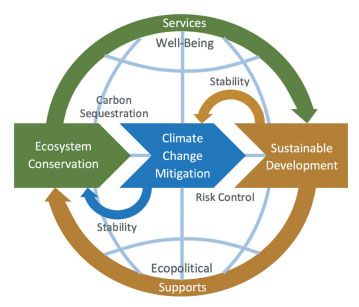In recent years, the issue of climate change has become a pressing concern for governments, businesses, and individuals around the world. The impact of rising global temperatures, extreme weather events, and dwindling natural resources is becoming increasingly evident. In order to combat the effects of climate change, conservation efforts play a crucial role in mitigating its impact.
Preservation of Natural Habitats
One of the most important aspects of conservation in climate change mitigation is the preservation of natural habitats. Forests, wetlands, and other natural ecosystems play a vital role in sequestering carbon dioxide from the atmosphere. By preserving these habitats, we can help to reduce the amount of carbon dioxide in the atmosphere, thereby mitigating the effects of climate change.
Protection of Biodiversity
Conservation efforts also play a key role in protecting biodiversity. As temperatures rise and habitats are destroyed, many species are facing extinction. By conserving natural habitats and protecting biodiversity, we can help to ensure that ecosystems remain intact and functioning properly. This, in turn, can help to mitigate the effects of climate change.
Sustainable Land Use Practices
Another important aspect of conservation in climate change mitigation is the promotion of sustainable land use practices. Agriculture, deforestation, and urban development all contribute to the release of greenhouse gases into the atmosphere. By promoting sustainable practices, such as organic farming, reforestation, and smart urban planning, we can help to reduce these emissions and slow the pace of climate change.
Conservation of Water Resources
Water is a precious resource that is under increasing pressure due to climate change. Conservation efforts aimed at protecting water sources, reducing pollution, and promoting efficient water use can help to mitigate the impact of climate change on water availability. By preserving water resources, we can ensure that ecosystems remain healthy and functioning properly, even in the face of a changing climate.
Education and Advocacy
Another important aspect of conservation in climate change mitigation is education and advocacy. By raising awareness about the importance of conservation and encouraging individuals and communities to take action, we can help to generate support for conservation efforts. Through education and advocacy, we can empower people to make sustainable choices in their daily lives and support policies that promote conservation and climate change mitigation.
Conclusion
Conservation plays a crucial role in mitigating the effects of climate change. By preserving natural habitats, protecting biodiversity, promoting sustainable land use practices, conserving water resources, and engaging in education and advocacy, we can help to reduce the impact of climate change on our planet. It is essential that we all work together to support conservation efforts and address the challenges posed by climate change. Only by taking action now can we hope to create a sustainable future for generations to come.

